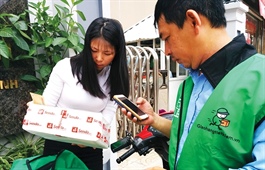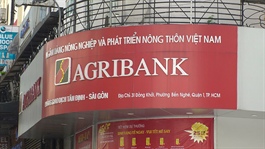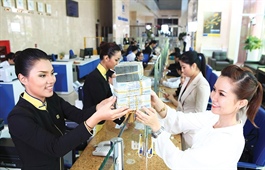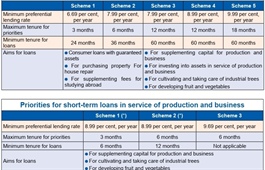Give and take is not a given when money is digitized
Give and take is not a given when money is digitized
Cashless transactions look like a win-win situation, but issues of privacy and individual freedom are far from guaranteed, and there are some disquieting implications.
The other day, I went for a bun cha on Duy Tan Street in Hanoi's Cau Giay District.The street, which bustles with offices, coffee shops and a wide range of eateries, hosts many sidewalk stalls that serve traditional Vietnamese dishes like pho, banh mi and bun cha (rice vermicilli with pork pies).
I usually have lunch on the sidewalks in Hanoi, spending around VND50,000 ($2.15) per meal, which I find affordable and convenient. That day, a young employee suggested that I pay the small bill with a mobile app.
Curious, I agreed, and with the staff’s guidance, it took less than a minute to set up the app and pay for lunch. In return, I received a 15 percent discount for the bill, which was nice. I felt good.
Then I began thinking about all the advantages of a cashless society that the Vietnamese government and other governments have targeted. The advantages of e-commerce were starkly evident during the social distancing campaigns necessitated by the Covid-19 outbreaks.
Across Vietnam's densely populated cities, payment through apps has become a regular part of personal transactions, something that is likely to make tax authorities smile. Mobile wallets are replacing the polymer banknotes, not just via e-commerce, but also in trading between individuals, between customers and restaurants, and even between individuals and street vendors.
I asked the Duy Tan Street eatery how the app payment method helps. They responded without hesitation that the benefits were quite clear – it was convenient for both the customers and businesses, saved a lot of time for both parties, was safe and in most cases, that app was either free or cost very little.
A mobile wallet app in Vietnam announced recently that it has had tens of millions of users and hundreds of thousands of stores and restaurants that allow customers to use it for payment. With such an attractive market, it is obvious that businesses that are giants in other areas, like telecommunications, phone manufacturing and ride-hailing services, have also joined the race to launch their own digital payment services.
In the Digital Money Index report released by Citibank last year, Vietnam ranked 61st among 84 countries in digital money readiness. It was 59th in terms of government and market support, 63rd for financial and technology infrastructure and the same position for presence of digital money solutions, and 56th for propensity to adopt.
The government has been working assiduously towards creating a cashless society. It launched a national five-year (2016-2020) program for developing non-cash payment in Vietnam and there are some obvious impacts to be applauded.
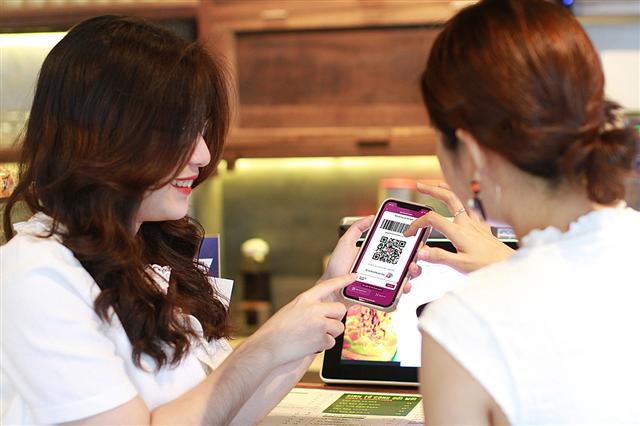
A woman guides another to use an e-wallet called MoMo for payment in HCMC, November 2020. Photo coutersy of MoMo.
|
The other side
As the restaurant staff informed me, a cashless economy has evident benefits. People would feel safer, worrying less about losing their wallet, money and other stuff. Sellers will not have to take the trouble to prepare enough cash to give as change to customers, spend a lot of time on bookkeeping or investing in a safe box. It will be easier for the state to collect taxes, and estimate the size of the informal economy because there is more data on the spending activities of people, small businesses, business households or even street vendors.
But we have to go beyond the obvious benefits when we assess a new, hi-tech convenience.
Right off the bat, it is not going to be very easy to digitize money in Vietnam.
Most Vietnamese people in the countryside do not make it a practice to have bank accounts, let alone using a mobile app on their smartphone for payment.
The explosion of payment applications in urban areas easily leads to inequality, with some large groups of people having no access to technology in rural areas.
But even more important is the issue of security risks.
Not having to worry about being robbed on the streets is fine, but if our accounts are attacked, what we lose would be much more than the money we carry on our person.
It's a fact that there have been more and more cases of fraudsters appropriating money through digital banking transactions or telephone transactions. This shows that many people and even banks have not fully anticipated all the security risks posed by the digital age.
Equally important is the issue of privacy and individual freedom.
The information on personal spending can reveal a lot about one person, especially with the help of the AI technology that tracks users' behavior and analyzes big data.
For example, if one is recorded as spending a lot on fast food and food with high sugar content, it is not difficult for some life insurance firm or healthcare service to have that information to approach that person sooner or later. And obviously with a higher risk of illness, they will charge that person higher premiums.
In some countries, a system to rank its citizens has been established, based on such personal information gathering and analysis. Like private financial credit scores, a person's social scores can move up and down according to this recorded behavior. Low scoring citizens can be limited from certain services and their accounts can be blocked easily.
By the end of 2018, China had banned up to 23 million people from buying plane or train tickets as part of the nation’s "social credit" system.
As citizens, we do not want to have a third or fourth party access our billing information.
Japan, surprisingly, is one of countries still in favor of cash. It is one of the most cash-based economies in the advanced world, government statistics show, with its cashless ratio below 20 percent against 96 percent in South Korea and 66 percent in China, Reuters said in a report last December.
According to the Financial Times, up to 60 percent of restaurants in Tokyo only accept payment in cash.
Cash, in fact, represents many of the characteristics that people prefer. It ensures anonymity and no traceability, it is easy to use and tally, it saves one from worries about banking security, and it is easy for one to control her or his spending behavior than using a card because they will have the tendency of not spending more than the sum they are carrying with them.
In a society that is still transitioning and the tax system is not really fair, cash is the only way for many people to run their businesses without paying bruising taxes. This is the case not just in Vietnam. Many stores and restaurants I have visited in other countries require customers to pay in cash.
Can the benefits of digitalization be reconciled with the loss of privacy and the intrusion of AI into our spending and reading habits, as is already happening in a big way? Can service providers and the government guarantee that our personal information will not be used against us or abused for purposes that individuals have no say over?
Can we develop a clear and transparent legal system and build public trust in the integrity of the state apparatus?
The answers to these questions have far-reaching implications for us, individually and as a society.
Consumer confidence and trust cannot be digitized very easily; but is there going to be a digital solution to fixing it, once it’s broken?
We need to ponder this before the fix is in.
*Nguyen Khac Giang is a Vietnamese researcher at the Vietnam Institute for Economic and Policy Research. The opinions expressed are his own.







